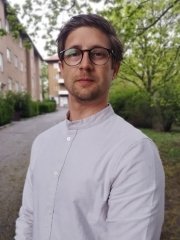Johan Rehnberg receives grants from FORTE
Johan Rehnberg at ARC is awarded FORTE grants totalling SEK 2.4 million for a postdoc position in the Netherlands to conduct research on "Improving public health in the elderly population: is there a contradiction between efficiency and inequality?".

What were you thinking when you found out you received the FORTE grant?
I was, of course, pleased and relieved that my application and the proposed research were considered good enough to be funded. It will be exciting to run my own project after working in other researchers' projects so far. Then I look forward to having the opportunity to work at a university in another city and country. I both studied and defended my thesis in Stockholm. To experience a different research environment will be instructive and exciting.
Which university in the Netherlands will you be affiliated with as a postdoc?
I will be affiliated with Amsterdam University Medical Center (UMC) and Vrije University. I will work in a group led by Professor Martijn Huisman that creates the survey Longitudinal Aging Study Amsterdam (LASA).
When will you go there?
My plan is now to start the project in January 2021 and to travel to Amsterdam shortly thereafter.
Will there be changes to the plans because of corona?
The planned start date for the project was originally September 2020, but due to the circumstances we made the assessment to postpone the start until January 2021.
How long will you stay?
The project is scheduled to last two years, I will spend about two thirds in Amsterdam and one third at KI during that period. The project assumes that I work with comparative data both in Amsterdam and Stockholm.
What kind of research will you work on there?
Jag kommer att forska om hälsoojämlikheter bland äldre personer med hjälp av två datamaterial: Undersökningen om äldre personers levnadsvillkor (SWEOLD) och Longitudinal Aging Study Amsterdam (LASA). Mer specifikt går projektet ut på att undersöka hur fördelningen av flera väletablerade riskfaktorer för ohälsa är spridda i den äldre populationen och mellan socioekonomiska grupper. Planen är sedan att estimera hur en förbättring av dessa riskfaktorer kan påverka fördelningen av ohälsa och bedöma om hälsoojämlikheter ökar eller minskar som en följd av en sådan förbättring.
Är det en ren fortsättning på den forskning du bedriver här idag?
I will examine health inequalities among older people using two data: the Survey on The Living Conditions of Older People (SWEOLD) and the Longitudinal Aging Study Amsterdam (LASA). More specifically, the project aims to investigate how the distribution of several well-established risk factors for illness is spread across the elderly population and between socio-economic groups. The plan is then to estimate how improving these risk factors can affect the distribution of illness and assess whether health inequalities are increasing or decreasing as a result of such an improvement.
